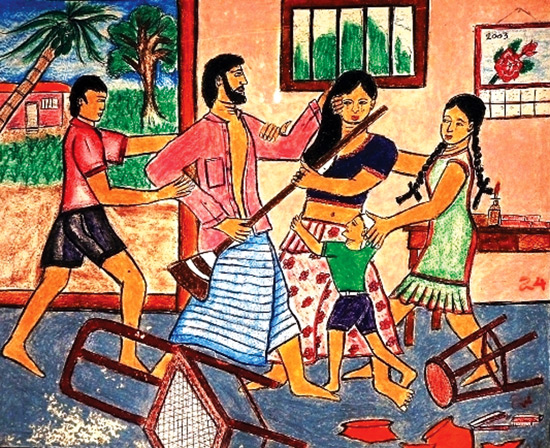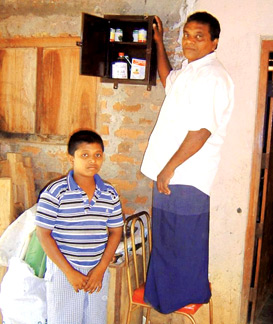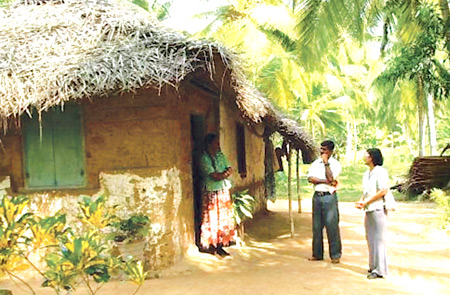Who cares if I live or die?
By Carol Aloysius
|

The Sumithrayo Rural Program regularly conducts art contests for
school children to help them express their inner feelings. This
pic shows the reaction of children whose studies have been
disrupted due to the constant fighting between their parents. |
It was the unending beating by her husband that put the final nail in
the coffin. Unable to endure his brutal assaults, for Sumana 24, a young
wife and mother of two, there was only one way to escape from her daily
nightmare. She would end her life.
While that first attempt at suicide failed, she was determined to go
ahead with her desperate decision when she found living with an abusive
alcoholic husband who beat her on a daily basis became unbearable.
“She had kept a collection of kaneru seeds hidden inside her mud hut,
and showed them to me when I first met her in her little home in the
village. She refused to give them to me saying, “This is all I have to
escape from my miserable existence”, Lakshmi, Directress of the
Sumithrayo Rural Program, and a Volunteer at Sri Lanka Sumithrayo for
many decades, recalls ten years on….
| * According
to Police records 2,703 males and 752 females committed
suicide last year.
* The National Child Protection
Authority (NCPA) this week has been reported as saying
it was conducting a public awareness program for
parents, teachers and those involved in child welfare to
prevent teenage suicides.
* The Authority is reported to
have initiated a ‘Cyber watch’ too, to prevent suicides
by children. |
|
“So I did what I usually do with distressed people suchas Sumana who
have suicidal thoughts. I put my arms around her and hugged her. I let
her know I was there to listen to her and that I cared for her. That
simple gesture helped her release her inner turmoil. As she broke down
in a flood of tears, I let her cry out her pain, anger and despair for
as long as she wished. It was an emotional moment for both of us.”
Suicidal thoughts
“ It is unbelievable how just putting one’s arms around someone who
has lost her self esteem, can help a person overcome suicidal thoughts”,
she says in retrospect. “By hugging Sumana at a time when her self
esteem was at a new low because her overwhelming grief had blinded her
to anything beyond her immediate situation, and listening to her, I
showed her that I valued her as a person and cared for her, even though
she had felt that no one cared whether she lived or died.
More visits to Sumana’s mud hut, helped forge a close rapport based
on trust between the two women. “Once she realised I was her friend and
not someone who wanted to pry into her family secrets, she opened up.
She told me that her husband, a casual labourer mistrusted her and
suspected her of being unfaithful to him. Hence the daily beatings. “I
have two little children and I spend the entire day inside this hut
looking after them and cooking his meals, but he still accuses me of
being unfaithful”, she says.
Lakshmi‘s strategy was to befriend her husband as well so that the
couple could discuss the matter openly. Initially he rejected my
efforts. Then one day he greeted me with a smile, and his wife happily
told me he was cooking the noonday meal for the family, and was now
drinking less and had stopped beating her. Her husband also informed me
he had given Sumana permission to go to the Middle East to earn money to
build a proper house for them, and that the grandmother would look after
the kids till she returned. I was happy for them. What this young couple
needed at the time was coping strategies, which I was able to discuss
with them. They found their own solutions” Lakshmi says in retrospect.
“We don’t offer advice or therapy. We give those in need of our help
emotional support. That’s how Sumithrayo operates.”
|

Safe storage lockable boxes - a way to minimise the use of
pesticide for suicides and keeping the lethal poisons out of
reach from children. |
As she explains,“Sumithrayo offers an alternative, to people when
things go wrong and life becomes too much to cope with. As befrienders
we are there when no one else cares, listens or tries to understand
them”, she said. These principles she says are based entirely on the
principles of Chad Varah, founder of Samaritans (being a friend in
need,) whose overseas branches came to be later known as Befrienders
Worldwide.
Dedicated volunteer
“It is the Samaritan Principles and Practices, that Sumithrayo
founder, Joan de Mel, a former Samaritan who worked with Chad Varah
followed, and which Sumithrayo still abide by”, says Mala, another
dedicated volunteer and befriender from Sumithrayo.
“The primary objective of our organisation is to prevent suicide by
befriending people who are lonely, distressed and in despair over
diverse issues in their lives such as broken relationships, marital
difficulties, infidelity, other family problems, drug dependency sexual
concerns and other personal issues, Individuals who carry a burden they
cannot share with anyone. We give them a listening ear, show them we are
completely non judgemental and accepting of all situations and peoples”,
she explains.
One of the main challenges these dedicated volunteers face is
sometimes getting lonely unhappy individuals to open up.
Mala cites one case where a teenager whose studies had been disrupted
by constant bickering between her parents had almost driven the young
girl to the verge of suicide.
“Eighteen year old Rupa visited one of our Urban centres recently.
She came alone and sat in front of me without looking at my face. She
remained silent for a long time and I didn’t wish to force her to talk.
So I told her I was going to the next room to make her a cup of tea and
before I left, I gave her a blank sheet of paper and gently asked her to
write how she feels. When I returned, she silently handed me the piece
of paper on which she had drawn what looked liked a small pizza. When I
asked her what it meant, she grabbed the paper from me and began
furiously scribbling on it, as the words came tumbling out.“My problem
is my parents”, she told me. “Their daily verbal battles have prevented
me from concentrating on my studies and I know that I will fail my law
examination if they don’t stop. Can you help me? She whispered and began
to sob. I held her hand and let her cry trying to understand what she
was telling me through her tears. Much later a more relaxed and calm
girl asked me if she could bring her parents the next day.
Daughter’s misery
|

Reaching out to the lonely and distressed. |
Rupa returned with them a day later. The mother and father were
befriended separately and both were very distraught that they had
contributed to their daughter’s misery. The parents realised for the
first time that their constant fighting often over trivial things upset
their children. The husband complained his wife was paying too much
attention to their two children, and neglecting him. The wife said he
used to shout at her when she failed to cook some of his favourite spicy
dishes. “We didn’t realise it was causing so much distress to our
daughter”, they admitted. By unburdening all the pent up feelings Rupa
had within her she was able to see that keeping herself closed inside
her room would get her no where and that expressing her fears to her
mother and father would have been a better option.
Lakshmi and Mala agree that many problems that trigger suicidal
thoughts start of as trivial matters, which could be blown out of
proportion to trigger suicidal thoughts if the individuals concerned are
already unhappy and feel they have no one to talk to who cares or
understands them. As they point out, “A common belief is that people who
talk about killing themselves never actually do it. In fact 70 percent
of people who have killed themselves have talked about it before hand
and had no one paying any attention.” Lakshmi also notes that while the
suicide rates have definitely plummeted from the very high rates in the
early 1990s, data on ‘attempted suicides’ collected by the Sumithrayo
Rural Program from hospital admissions in selected rural hospitals in
the southern and north western provinces suggested the number had risen,
over the past decade.
The Rural program run by Sumithrayo is one of the organisations’s
biggest success stories, in suicide prevention.
The program which celebrated its 16th anniversary since its inception
in a tiny room in a village Buddhist temple (Swarnagiri Hettipola) has
now expanded its work to over 90 villages in the north western and
southern provinces.
The program has won an International Accreditation Award at the IASP
Convention in Beijing; China in 2011 and was the recipient of a similar
award in the Asia Pacific region in Hongkong in 2008. The results of a
pilot study in collaboration with Oxford University on Secure Storage of
Pesticides to Reduce Suicides in Rural Sri Lanka was published in 2008,
and was followed by a similar four year study supported by the WHO, the
results of which will be published shortly.
Considering the fact that Sumithrayo began in a very small way, in
1974 in two tiny rooms at Deans Road Maradana, this is indeed an
achievement.
Remain anonymous
Now in its 40th year of existence, the organisers say over 200 people
contact the 11 Sumithrayo centres in the island every week. They either
visit, telephone or write in their problems. Not all the callers are
suicidal. “You don’t have to be suicidal to talk to Sumithrayo. The
majority in fact simply want someone they don’t know and don’t even see
sharing their problems, fears and anxieties, on the basis of
confidentiality.
The volunteers try to remain anonymous as far as possible.” |

